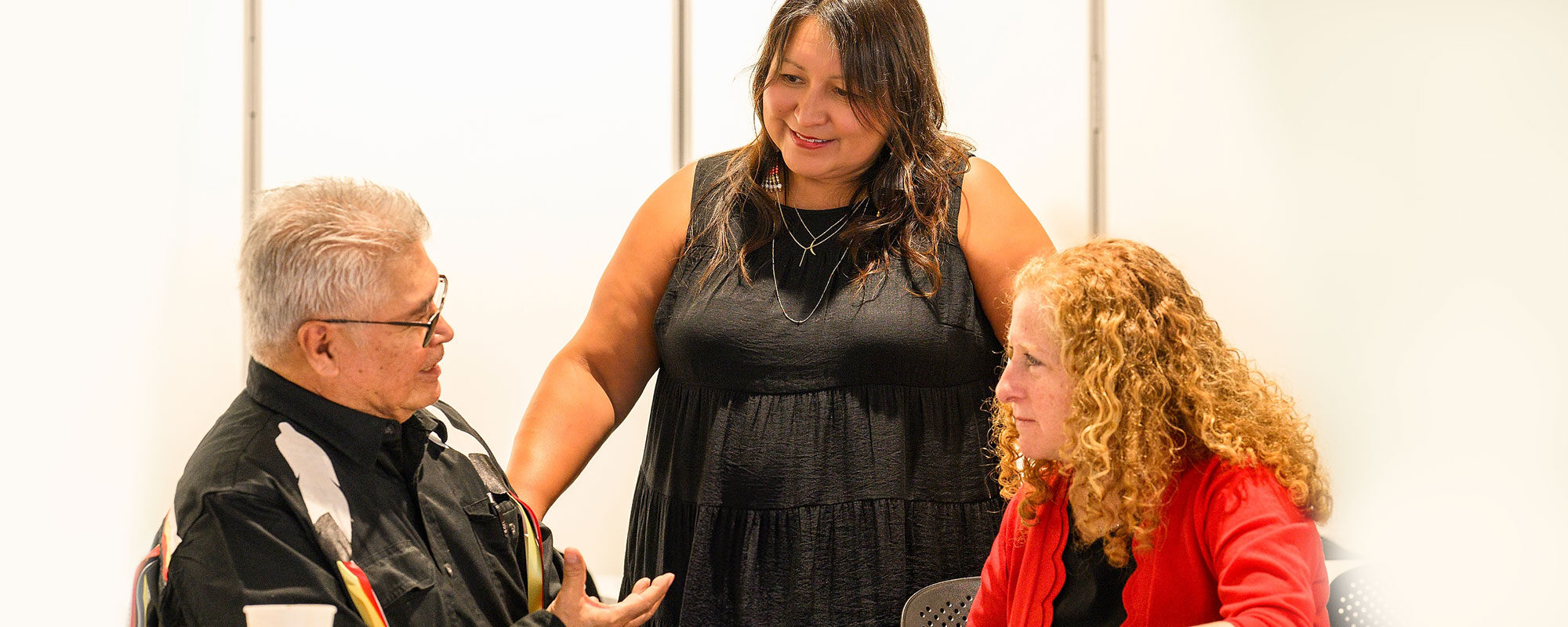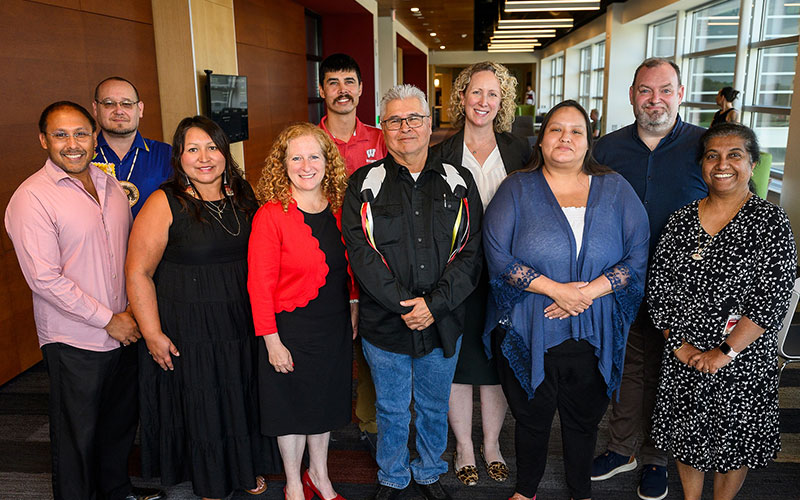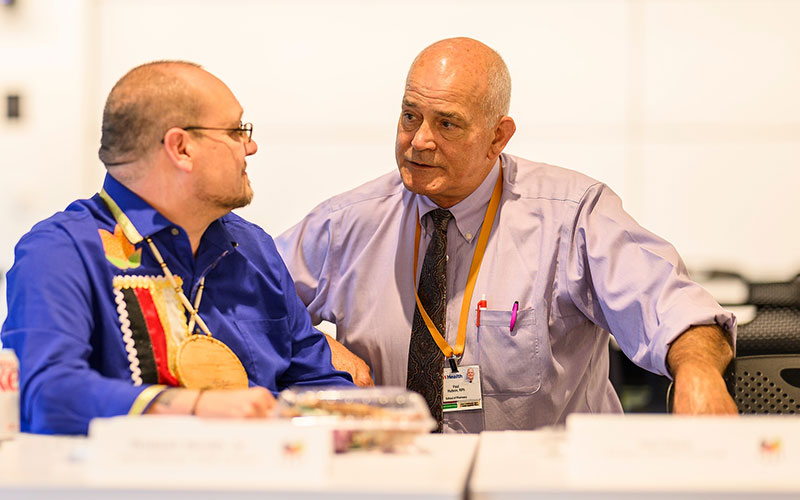Art Walaszek named associate dean for faculty affairs and development
Dr. Art Walaszek has been named the next associate dean for faculty affairs and development at the University of Wisconsin School of Medicine and Public Health.

From their home near the forested lakes of Mole Lake, Wisconsin, the Tribal Council of the Sokaogon Chippewa Community (SCC) traveled to the University of Wisconsin–Madison, where they were welcomed by health sciences and biomedical researchers and staff.
In a historic meeting on September 11-12, the group discussed collaborating on clinical trials and health data collection, along with strategies to improve health within the SCC Mole Lake Band of Lake Superior Chippewa. Visits to UW’s campus by a full tribal council are extremely rare, and tribal chairman Robert VanZile, Jr. praised the School of Medicine and Public Health and Chancellor Jennifer Mnookin for allowing opportunities like these to unfold. He also underscored the need for action.
“This concept came out of a dream to help our people,” said VanZile. “We need to roll up our sleeves and get to work. One of the ways we do that is by having our people here, talking with all of you at this table.”
The relationship began almost a year ago, with a phone call from the tribe’s chief information officer, Jason Neilitz, to Kurt Zimmerman, who leads the school’s Office of Biohealth Industry Partnerships. Neilitz had just learned that Wisconsin’s new federal designation as a regional Biohealth Tech Hub was expected to bring substantial investments in personalized medicine and biohealth technology.
“Jason wanted to know what personalized medicine could look like,” Zimmerman recalled. “Our first conversation turned into a weekly dialogue. He represents a very progressive tribal council, who were imagining how they could support this Biohealth Tech Hub initiative, and how their community might benefit.”
Phone conversations led to a virtual meeting in April between the tribal council and UW researchers to pinpoint areas of collaboration. Two possibilities emerged: participation in clinical trials, and health data sharing. Both could eventually lead to better treatments and therapies for persistent community health issues, such as diabetes and opioid addiction. A community-based clinical trials model would be a cutting-edge development, Zimmerman said — American Indian/Alaska Native people represent less than 1% of clinical trial participants — but building the relationship comes first.
In May, tribal chairman VanZile invited UW staff and researchers to visit his community, where they met with the tribal council and tribal health clinic staff, shared meals of wild rice and fish from tribal council member Leelyn VanZile and toured the reservation.
“The dialogue we had with the community was incredibly exciting,” said Zimmerman. “They were skeptical, inquisitive, curious — every question was one that needed to be asked.”

A tribal collaboration can feel methodical, according to Carla Vigue (Oneida), director of tribal relations at UW–Madison. Historic injustices make building trust especially important.
“There are steps that tribal leaders take to make sure their community is safe, respected and treated well,” Vigue said. “Both sides have been thoughtful about moving forward together, listening and learning from one another in a way that is mutually beneficial.”
Wednesday’s presenters included Betsy Nugent, chief clinical research officer, and Dr. Rafael Veintimilla, the senior director of clinical trials integration and medical science liaison for the UW School of Medicine and Public Health. Nugent explained how clinical trials unfold and their importance to advancing medicine. Veintimilla stressed the need to make early-stage (Phase 1) trials patient-centric by addressing barriers, questions and concerns.
Throughout the day, tribal council members voiced their own questions and concerns. Some community members will need help understanding technical language on consent forms. Many will need reassurance about clinical trial safety. They also shared a wide range of environmental, social and infrastructure challenges affecting tribal community health, from mold in houses to pesticides in groundwater to alcoholism.
“We have unhealthy conditions leading to illness,” said VanZile.
Dr. Robert N. Golden, dean of the UW School of Medicine and Public Health, who addressed the group via Zoom, said the chairman was “spot-on” in recognizing this.
“Education, housing and the air and water around you are key ingredients to health,” Dr. Golden said. “We would be happy to be partners in advocating on behalf of the people in your community who are struggling.”
Golden also stressed the importance of including underrepresented populations in clinical trials.
“We know that the more diverse the clinical trial, the better the data will be in identifying the clinical response and side effect profiles,” he said. “We intend to grow our clinical trials program strategically to ensure that historically marginalized groups are well represented or even oversampled to make up for their lack of representation in other related studies.”
Before the group broke for lunch with Chancellor Mnookin, VanZile said a blessing in Ojibwe. In her lunch remarks, Mnookin referenced VanZile’s earlier words about “rolling up our sleeves” and emphasized her priority to work in partnership with Wisconsin’s Native nations “to uplift your goals, support your efforts and make new possibilities for all of you, and for our institution.”
The group also discussed the importance of health data sharing with Jomol Mathew, who heads the new Wisconsin Health Data Hub. Currently, Mathew said, researchers rely on a large body of data drawn from areas close to Madison. To develop medications and therapeutic strategies applicable to everyone, the school needs collaborations that enable it to gather data from underrepresented communities around the state.
Presentations from Dr. Amy Kind, who directs the UW Center for Health Disparities Research as well as the Wisconsin Partnership Program (WPP), and Melissa Metoxen (Oneida), Lauren Cornelius (Oneida) and Lina Martin (Ho-Chunk) from the Native American Center for Health Professions (NACHP), further underscored how the school helps Indigenous communities.

Jon Audhya, senior associate dean of basic research, biotechnology and graduate studies, wrapped up Wednesday’s activities with an overview of the school’s research enterprise and a tour of the Wisconsin Institute for Medical Research, before the group had dinner at Memorial Union. On Thursday morning, presenters included Paul Hutson, a professor in the UW School of Pharmacy, and Dr. Christopher Nicholas, associate professor of family medicine and community health, who are investigating treatments for opioid abuse, a critical public health issue for the tribal community.
“Having this working relationship with one another can make us better and stronger as we look forward, not back,” said VanZile, reflecting on the visit. “I like to think that our community at home could be an incubator for learning, academics and education.”
Photos by Althea Dotzour / UW–Madison